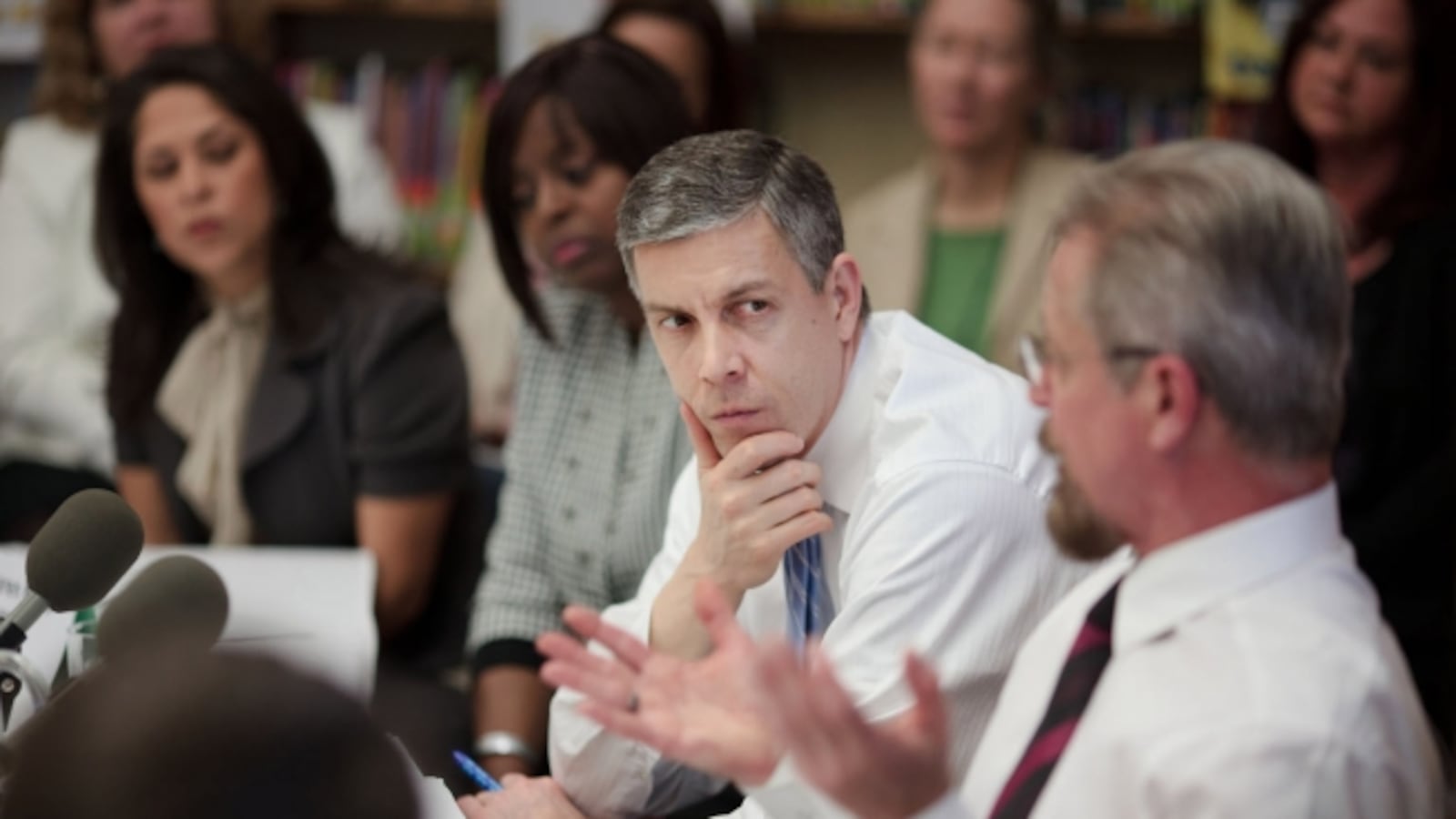When Arne Duncan became U.S. Secretary of Education, he asked predecessors of both parties for advice. That’s why he’s disappointed that he hasn’t gotten a similar call from the new secretary, Betsy DeVos.
“I reached out to everybody, not as a courtesy but because I had so much to learn — whether it was Secretary Riley who happened to serve a Democratic president or whether it was Secretary Spellings or Rod Paige,” both of the George W. Bush administration, Duncan said. “You’re going to agree on some things and disagree on others, but at the end of the day you’re all there for the same reason, theoretically.”
“What I learned from them was invaluable,” he said.
Duncan has become a sharp critic of DeVos’s tenure to date, especially the education department’s decision to rescind guidance related to transgender students and the Trump administration’s budget proposal. He’s gone so far as to tell charter leaders to refuse federal charter dollars if they came alongside large cuts to all public schools. He said that it would amount to “blood money.”
The budget has also been criticized by DeVos’s immediate predecessor, John King.
“Any rollback on rights — whether it’s special needs kids, LGBT kids, any rollback in terms of Title IX enforcement, civil rights enforcement — that’s a little mind-boggling to me, hard to understand, hard to justify,” said Duncan, who is now a managing partner at the Emerson Collective, working with young men to reduce gun violence in Chicago. (The Emerson Collective, through the Silicon Valley Community Foundation, supports Chalkbeat.)
Liz Hill, the Department of Education’s press secretary, defended the department’s Office of Civil Rights and DeVos’s record in a statement.
“During the prior administration, [the Office of Civil Rights’] reputation as a fair and neutral enforcer of the nation’s civil rights laws suffered as it sacrificed timely, neutral adjudications of individual complaints in favor of data collection efforts. Under this system, too many students waited months and even years for adjudication. That will not be the case under this Administration,” Hill said. “The Secretary’s commitment to OCR’s mission is unwavering and the office will defend all students to the fullest extent possible under the law.”
Meanwhile, as secretary, DeVos has issued a number of criticisms of the Obama administration, including Duncan’s school turnaround initiative. The fact that a federal study did not find benefits of the expensive program has become a favorite talking point of DeVos.
Sniping between a former Obama administration official and a Trump cabinet head would normally be unremarkable. But Duncan’s comments are more complicated because the education reform movement — including the expansion of charter schools and efforts to hold schools and teachers responsible for student test scores — has long held a bipartisan imprimatur.
Duncan, in particular, has received praised from the likes of Republicans Mitt Romney, Jeb Bush, Chris Christie and Lamar Alexander. (Many conservatives, though, soured on his approach, arguing that he engaged in federal overreach by incentivizing states to adopt the Common Core standards, among other moves.)
And Duncan, like DeVos, has supported the growth of charter schools. His signature initiative, Race to the Top, pushed states to lift or eliminate caps on charter schools. DeVos’s home state of Michigan, for instance, passed a 2010 law that expanded charters and allowed for the creation of two fully virtual schools in order to compete for federal money.
Duncan tried to distinguish his position on charter schools from DeVos’s.
“When you just focus on proliferation or growth rather than on quality, you absolutely hurt the movement,” he said. “I am not a supporter of charters; I’m a supporter of high-quality charters.”
Some say that Duncan’s policies haven’t always led to that — like in Michigan, where critics say the charter sector has lacked oversight and produced chaos. Last year, John King described the performance of Michigan charter schools as “uneven.”
Does Duncan have any regrets about his role in expanding charters?
No, Duncan said, pointing to a speech he gave in 2013 to the National Alliance for Public Charter Schools where he reiterated his support for the charter movement but challenged its leaders to be “more vocal and to step out on charter schools that weren’t succeeding, bad charter schools.”
When DeVos spoke to same group earlier this year, she issued a different challenge, encouraging charter leaders not to see themselves as the best solution, but to focus on school choice more broadly. She remained mum on to what extent charters should be held accountable for their academic performance.
Duncan says he believes there should be four overarching national goals for education: to expand “high-quality” pre-kindergarten; continue to improve high school graduation rates; ensure graduates are ready for college and careers; and “lead the world in college completion rates.”
“I haven’t heard one sentence from this administration about any of those goals; it’s lot of small-ball stuff,” he said.
In response, Hill pointed to DeVos’s priorities. “The Secretary is championing a robust agenda to reduce the federal role in education, expand school choice and empower parents,” she said, along with making changes to the Higher Education Act and federal student aid to “better serve students and taxpayers.”
However, DeVos may soon have one thing in common with Duncan: The National Education Association, the country’s largest teachers union, demanded Duncan resign in 2014. Earlier this year, NEA issued a letter to DeVos listing a number of concerns. If she does not address them by Sept. 1, the group will call on her to resign, too.


